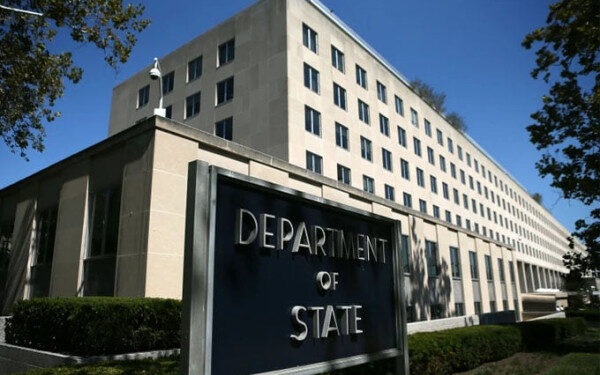Introduction
The United States has issued a sharp critique of Western Europe’s approach to regulating online content, claiming that recent laws aimed at curbing hate speech and harmful digital behavior are undermining human rights, particularly the right to freedom of expression.
The allegations come from the US State Department’s annual human rights report, which—interestingly—was presented this year in an unusually shortened form and notably softened its stance on certain countries with close ties to former President Donald Trump, such as El Salvador.
While the report condemned online speech restrictions in countries like Britain, France, and Germany, it also highlighted issues in other parts of the world, from the Uyghur crisis in China to political tensions in Brazil.
US State Department’s Concerns Over Europe’s Internet Laws
According to the report, measures implemented in Britain, France, and Germany to combat hate speech, misinformation, and extremist content online amount to “serious restrictions” on freedom of expression.
The State Department’s main argument is that while governments claim these measures are necessary to prevent violence and discrimination, they often cross the line into censorship, suppressing legitimate political opinions and public discourse.
The document specifically criticizes Britain’s crackdown on internet users following a high-profile criminal case involving the murder of three young girls. In that incident, some individuals on social media falsely accused a migrant of the crime and encouraged acts of revenge—prompting authorities to make arrests and issue warnings.
While British officials defended their actions as necessary to prevent racial violence, the US report argues that such interventions risk creating a chilling effect on speech, deterring citizens from engaging in open debate for fear of government reprisal.
The Concept of the “Chilling Effect”
In legal and human rights discourse, a “chilling effect” refers to a situation where individuals self-censor out of fear of punishment, even when their speech is lawful.
The US report warns that this is exactly what is happening in parts of Europe, where governments are increasingly empowered to remove online posts, impose fines, and prosecute individuals for statements that are deemed offensive or potentially harmful—regardless of whether they directly incite violence.
Critics argue that such powers can be easily abused to silence dissent, restrict political opposition, or suppress minority viewpoints.
Differences Between US and European Approaches to Free Speech
The United States maintains some of the world’s strongest constitutional protections for free speech under the First Amendment. American courts have repeatedly ruled that even highly offensive or unpopular speech is protected, unless it directly incites violence or constitutes a clear threat.
In contrast, European countries operate under legal systems that place greater emphasis on preventing harm, often at the expense of absolute free speech. Laws in countries like Germany criminalize Holocaust denial and hate speech, while France imposes penalties for speech that promotes discrimination or hatred against individuals based on race, religion, or ethnicity.
From the American perspective, such restrictions—however well-intentioned—represent a dangerous precedent.
The UK Case: Murder, Misinformation, and Government Response
The UK example cited in the report revolves around a widely publicized murder case in which three young girls were killed.
Following the tragedy, false rumors spread online accusing a migrant of committing the crime. Some social media users went further, calling for vigilante action.
British law enforcement responded swiftly, arresting several individuals and warning that spreading false information or inciting violence could lead to prosecution.
While supporters of the crackdown argue that swift action prevented hate-fueled violence, the US State Department’s report insists that broad arrests for online speech, even if offensive, risk undermining democratic freedoms.
An Apparent Double Standard?
The report’s criticism of European governments for restricting speech has raised eyebrows given the position of US Secretary of State Marco Rubio, who has publicly advocated revoking visas for foreigners whose statements or social media activity are deemed anti-Israel.
Observers note the contradiction: on one hand, Washington is warning against censorship abroad, while on the other, senior US officials are promoting speech-based immigration penalties that could also be seen as limiting free expression.
This apparent inconsistency has sparked debate among human rights experts about whether the US is applying its free speech principles consistently across different political contexts.
Beyond Europe: China, Brazil, and Other Highlights in the Report
The annual human rights report did not focus solely on Europe. It also:
- Described the treatment of Uyghur Muslims in China as “genocide,” reiterating long-standing US accusations of mass detentions, forced labor, and cultural suppression in Xinjiang.
- Referenced Donald Trump’s public support for former Brazilian President Jair Bolsonaro, despite allegations that Bolsonaro encouraged anti-democratic activities and was linked to incidents of political unrest.
- Avoided strong criticism of El Salvador, a Trump-aligned nation accused by independent observers of authoritarian practices.
These omissions and emphases have led some analysts to suggest that political considerations may have influenced the tone and content of this year’s report.
Reactions From Europe
While there has not yet been a coordinated European Union response, officials in countries mentioned in the report have historically defended their internet regulations as necessary safeguards against hate speech, misinformation, and extremist propaganda.
European leaders argue that unchecked online hate can fuel violence, deepen social divisions, and undermine democracy. They also point to tragic events—such as terrorist attacks and racially motivated killings—that were preceded by online radicalization campaigns.
In their view, responsible governance requires setting legal boundaries for online speech, especially in an era where misinformation can spread globally in minutes.
The Global Debate on Regulating the Internet
The disagreement between Washington and European capitals reflects a wider global debate over how to balance digital freedoms with public safety.
Key questions include:
- How should governments respond when misinformation leads to real-world harm?
- Can hate speech laws be enforced without infringing on legitimate political expression?
- Should tech companies, rather than governments, take the lead in moderating content?
In the US, platforms like Facebook, X (formerly Twitter), and YouTube already have their own content moderation policies, often removing harmful content even when it is protected under US law. In Europe, however, such removals are increasingly mandated by government legislation.
Potential Consequences of Overregulation
Human rights advocates warn that overly broad online regulations can:
- Stifle journalism, particularly investigative reporting that challenges powerful institutions.
- Silence activists working on controversial issues.
- Encourage self-censorship, weakening democratic debate.
The US report frames this as a human rights issue, suggesting that freedom of speech is not merely a domestic matter but a global standard that should be defended internationally.
Conclusion: A Growing Rift in Digital Governance
The US–Europe divide over online speech regulation is more than just a policy disagreement—it represents fundamentally different philosophies on the relationship between freedom and security in the digital age.
As governments worldwide grapple with the challenge of managing harmful online content, the tension between protecting citizens from harm and protecting their right to speak freely will only intensify.
For now, the US State Department’s latest report has added fuel to an already heated debate, raising questions about whether Washington’s criticism will lead to meaningful dialogue with its European allies—or simply deepen transatlantic rifts over human rights in the digital sphere.

























